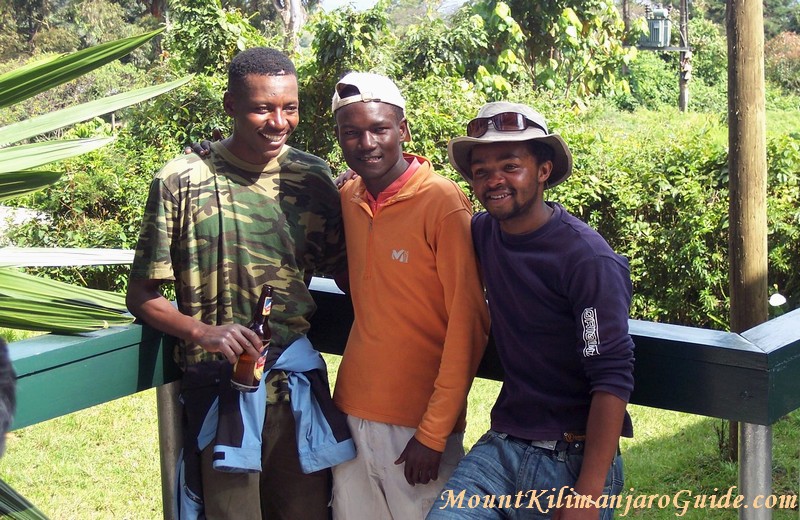Mount Kilimanjaro Guides
If you want to climb Mt. Kilimanjaro you have to be accompanied by a licensed Kilimanjaro mountain guide.
You are not allowed to climb Mount Kilimanjaro without a guide.
You also have to book your trip and guide through a Kilimanjaro trekking agency/climb operator that has been approved by the Kilimanjaro park authorities.
And since it is the trekking agency that will supply your Kilimanjaro climbing guide, the quality of the guide pretty much depends on the quality of the agency you book with.
The training process for Kilimanjaro guides explains why that is so:
 Simon (head guide), Josef (summit porter soon to be assistant guide), and Eli (assistant guide),
Simon (head guide), Josef (summit porter soon to be assistant guide), and Eli (assistant guide), some of the best Kilimanjaro guides you can find, after guiding yet another group to the summit.
Mt. Kilimanjaro guides have to work on the mountain for years before they can undertake training as a guide.
The first step in the career of a Kilimanjaro guide is to become a Kilimanjaro porter, and stay a porter, for several years.
The most diligent and ambitious ones, those who go out of their way to help around the camp and ensure that clients are happy, those exceptional porters are the ones who are eventually promoted to assistant guides. (Speaking English obviously helps.)
While this is a step up the ladder, it does not necessarily make life easier. The pay increases, but the work and responsibility increases disproportionately.
Assistant guides still help with the portering, especially on the first day or two. They do a lot more work around the camp, accept a lot more responsibility for client welfare, oversee the logistics, and, hardest of all, they have to climb to the summit with you. (Porters don't.)
From there it is only one more step to become a licensed Kilimanjaro climb guide: aspirants have to complete the training course that is held by the park authorities.
After that a guide receives his license and can go around looking for work.
The course is intensive and hands on, but at the core it is only a couple of weeks of training...
...and 90-95% of the students pass the final exam, which makes you wonder just how hard the exam is.
The quality of Kilimanjaro guides that come out of this process varies even though all of them hold the same license.
How do you find a good Mt. Kilimanjaro guide?
The best Kilimajaro guides work for the best Kilimanjaro tour companies, often exclusively. (For my personal recommendation go here.) In fact, the best guides will already have been working for one of the top agencies and have received training through them before they became licensed guides.
Good companies have permanent staff and supply additional training to them: recognizing and dealing with altitude sickness, first aid, communication skills, leadership skills...
They select the most suitable and talented among their staff to give them the chance to train as guides. It is in their interest to have the best guides possible. Their clients' satisfaction and sometimes their clients' lives depend on it!
But the majority of Kilimanjaro guides will graduate with the basic training supplied by the park authorities and will be freelancing, just like the Kilimanjaro porters.
There is another issue. How many guides/assistant guides are on your climb?
If you are with a larger group there need to be enough guides/assistant guides to keep an eye on everyone. This is essential at higher altitudes!
Larger groups invariably split up due to different walking speeds/fitness levels. Nobody should be out of the view of a guide for longer periods.
If someone experiences serious symptoms of altitude sickness this needs to be recognised IMMEDIATELY, and the climber has to be removed to lower altitude IMMEDIATELY. And a qualified guide needs to go with him.
Cutting costs by cutting down the number of staff can be dangerous. Cutting costs by skimping on training can be dangerous.
Not employing enough staff to cover for unexpected sickness etc. can be dangerous. If you pick up a mountain guide at a few hours notice, what do you know about his skills and experience? Nothing!
The better a Kilimanjaro guide, the better his chance to get regular, well paid work with a good agency.
The responsibility of a climbing guide is huge.
Leading a group of ten to thirty or more people up the mountain (yep, with staff you quickly reach those numbers on group climbs), and to keep everyone happy and things running smoothly, that is no easy task! It requires above average leadership and communication skills.
Unfortunately a guiding license is not a guarantee that the holder is up to the challenge.
Substandard logistics and execution can easily ruin a climb. And in the worst case scenario there is a lot more than your enjoyment at stake.
All will be fine as long as the weather holds up and there are no other complications, especially medical complications. It's when things turn bad that you need someone who knows exactly what to do and has the personality to make it happen, fast.
Trekking at that extreme altitude is very serious business.
Do you want to wait until things turn bad to find out how good your Kilimanjaro guide is?
Do you need help with all this?
Would you like to contact a responsible and trustworthy tour operator with competitive prices?
Get some free, no obligations advice on route selection, duration and timing?
I regularly receive emails asking me if there is a tour operator I personally can recommend.
There is and you can contact my preferred operator through this page.
Return to The true cost of climbing Kilimanjaro